Person of Interest at 10: Looking back on the techno-thriller's best episodes

Ten years ago today, one of the most subversive broadcast network shows of the 21st century conned its way onto CBS.
Created by Jonathan Nolan, Person of Interest, which debuted Sept. 22, 2011, initially presented itself as your typical CBS procedural. It starred Michael Emerson as Harold Finch, a reclusive billionaire and computer genius who built an artificial intelligence, a.k.a. the Machine, for the government to surveil the entire country and prevent the next 9/11; however, as the opening saga sell explains, the Machine saw everything, including ordinary everyday crimes. To that end, Finch hires a burned CIA agent, John Reese (Jim Caviezel), to help stop crimes irrelevant to national security. In each episode, the Machine would give them a social security number and they would have to investigate to find out if that person was a victim or perpetrator. Along the way, Finch and Reese picked up allies like Joslyn Carter (Taraji P. Henson), a virtuous NYPD detective who helped save numbers and handle a brewing mafia war, and Lionel Fusco (Kevin Chapman), a formerly corrupt cop seeking redemption. Simple enough, right? Person of Interest could've run on that premise forever.
However, the show didn't stop there. Person of Interest was very wary of police from the start (see the ongoing storyline about a corrupt group of cops called HR), but as it became increasingly critical of the post-9/11 surveillance state and War on Terror, it delved deeper into the sci-fi elements of its premise. The techno-thriller was also successful because of two additions to Team Machine: Sameen Shaw (Sarah Shahi), a government assassin who unknowingly handled the relevant cases for the government until she was blacklisted, and Root (Amy Acker), a hacker who chooses the Machine as her new deity. By the end of the third season, Person of Interest transformed into a show about a secret war between two A.I.s and their acolytes: the Machine, which was relatively good thanks to its creator, and Samaritan, a cold entity that valued order above everything else. The writers balanced that heady battle for the soul of the world with a grounded storyline about the shifting criminal landscape in New York. (Aside: It's truly fascinating that in the 2010s, CBS was home to two thought-provoking and technology-minded dramas that used the procedural format to push challenge the network's brand: Person of Interest and The Good Wife.)
"I had a long experience with not only CBS, but episodic and procedurals and knew what CBS wanted, and I know what was running the network and what the wanted. And it was not where we were taking the show," says co-showrunner Greg Plageman, who joined the pilot to help Nolan, a first time TV producer, steer the ship. "It was almost like we snuck in, in sheep's clothing."
In honor of the show's 10th anniversary, EW hopped on Zoom (as one does these days) with Nolan and Plageman to look back on some of the show's most memorable episodes.
"Pilot" (Season 1, Episode 1)
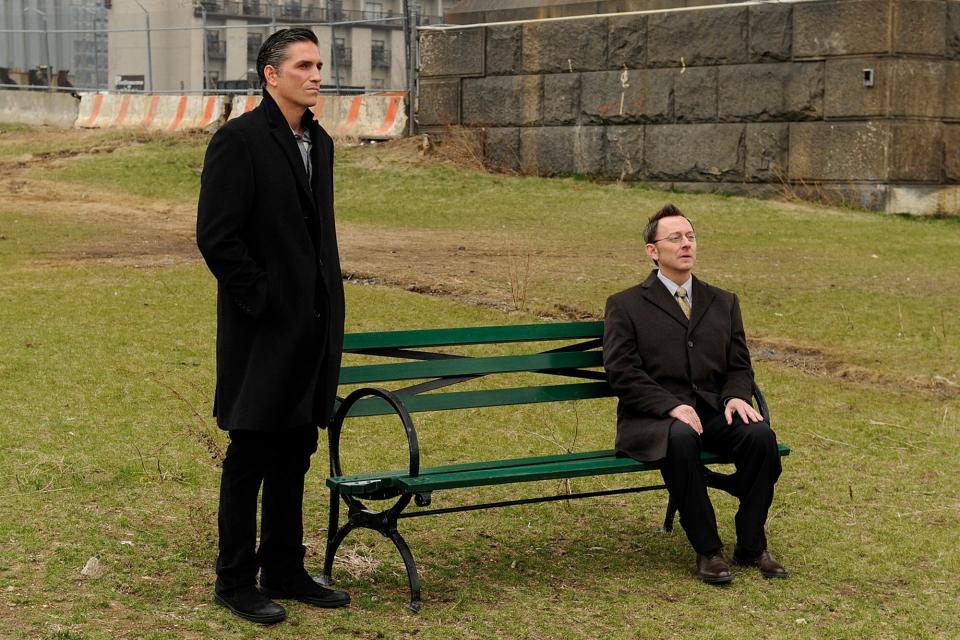
Jeffrey R. Staab/CBS via Getty Images A scene from the pilot episode of 'Person of Interest.'
When the series begins, the Machine has been operational for many years. Finch locates and recruits Reese, who is homeless, to help him handle the irrelevant numbers. Thus, Reese becomes known as the Man in a Suit, a well-dressed do-gooder who shows up when there's trouble, which places him Det. Carter's radar. Looking back at the pilot, Nolan and Plageman recall the disastrous table read that started it all.
JONATHAN NOLAN: Pretty much everything that could go wrong went wrong, but we must've had the world's worst table read. Michael Emerson couldn't be there, long story, and there was some contention about whether there was even to be a table read. Foolishly, I agreed to read the stage directions. It's a very high-concept pilot, [and] a lot of it comes down to Michael Emerson explaining what the hell is going on in the show. I though the script for the pilot was fine, but it was pages and pages of Not-Michael Emerson explaining and me stumbling my way through the stage directions. And I think if you went back and polled the folks at Warner Bros. and CBS, that must've been the worst table read of all time. It was very clear to us coming out of the table read, that the show was not going to go forward.
GREG PLAGEMAN: Total panic set in after the read-through. There was talk of recasting. [The powers that be asked], "Jonah, can you completely cut the whole scene in Central Park where Harold Finch explains what the Machine is? It's just way too long, no one's going to sit for that." I don't think we cut a word of that in the pilot.
NOLAN: We were asked to cut it and we did not, because our contention was that Michael Emerson could make it work, and he did.
"Witness" (Season 1, Episode 7)
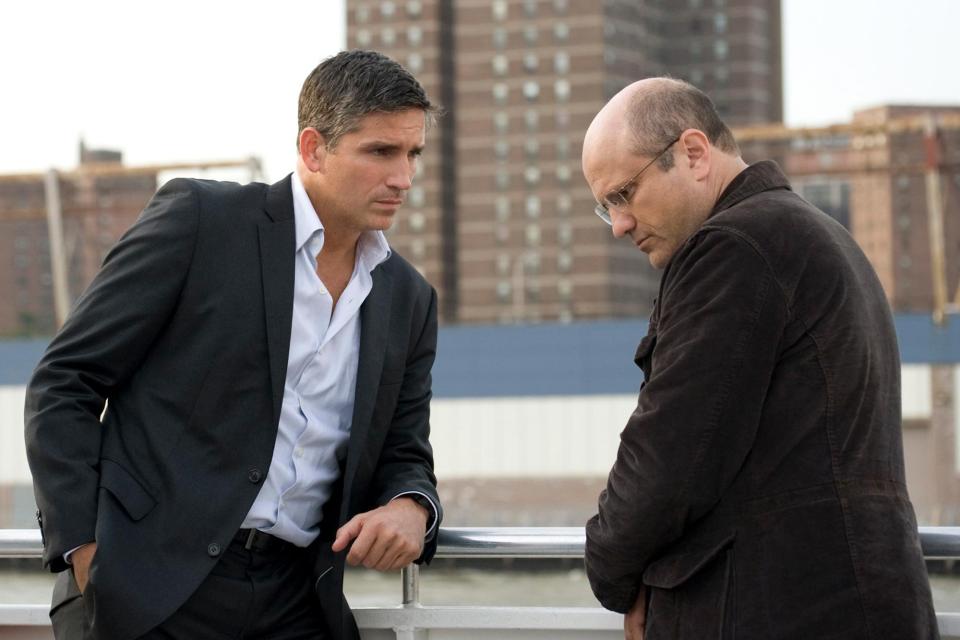
John P. Filo/CBS via Getty Images Charlie (Enrico Colantoni, right) and Reese (Jim Caviezel, left) in the 'Witness' episode of 'Person of Interest.'
Finch and Reese are tasked with protecting Charlie Burton (Enrico Colantoni), a seemingly innocent school teacher on the run from the Russian mob. However, the case isn't all that it seems. While Charlie isn't a perpetrator in this specific instance, he's not just a victim either. At the end of the hour, the dynamic duo learns that Charlie is actually Elias, a new player in the city's criminal underground who wants to wrest control of the Five Families and tells our heroes to stay out of his way. Written by Amanda Segel, "Witness" broke the show's established format with its downer ending, and expanded the show's world because Elias would go on to become an important recurring character in the ongoing municipal storyline. While Nolan and Plageman both note how supportive CBS and studio Warner Bros. TV were during the show's run, they do recall how this episode drew some pushback from the network.
NOLAN: [Director Frederick E.O. Toye] delivered a spectacular episode. It has this beautiful gut punch of an ending where our heroes lose. And we picked the Nina Simone song for the end of this, and we thought that was f---ing great. And here we introduce Enrico, he's this terrific actor and here's this amazing character. And the network was not happy. They were very distraught to say the least, and it was the first fight we had about the identity of the show. They said, "Well, they can't just lose." And we said, "No, but we're building this whole thing. It's like Batman, you got a rogues gallery, and Enrico is going to come back and we'll do more episodes. Eventually, they'll get him, [but] it'll take a while."
It did to get a point where they didn't want to air the episode. And this is what saved us: We said, "Well, we're not changing it. We think it's great. And if you don't want to air it, we don't have another episode. So you're going to be down an episode for [November sweeps]." That saved us because it was like, we're either off the air for a week or we're airing this. And this where we're planting a flag that the show is going to have a serialized component. It's not just a case of we us saying it's vitally important our characters lose at some point, because how do you define victory if there's never loss. Eventually, to their credit, they relented and allowed us to start moving the show, which had always been the plan, towards this carefully serialized format.
"No Good Deed" (Season 1, Episode 22)
When a mid-level NSA analyst named Henry Peck comes extremely to discovering the Machine's existence and leaking it to the press, it falls on Finch and Reese to protect him because the government decides to assassinate him to protect the program. While it may seem as though this story was inspired by Edward Snowden, this episode aired a full year before the former NSA contractor exposed the extent of America's surveillance program. In hindsight, "No Good Deed" was one of the earlier signs that even the relatively conventional first was working on a different level.
NOLAN: David Slack did a terrific job writing the script. [This] was a funny one because this episode was originally pitched as episode 5. I think we even started talking about it for the pitch packet when we wrote the pilot. There [was] a story arena document [with this idea], and I think the arena got to the network as episode 5 and they went, "No, no, no. What is this stuff?" In that case we said, "You know what? Actually, it's early." The point they made, and it was fair and it wasn't just the serialized, was like, "Guys, we just set this concept up. It's early to start to unpacking it and going meta with it." So we slid it back down the line and put the story arena away and returned to it [later in the season].
The point afterward where people say, "Oh, it's so prescient. How did you know?" It's like, "We read the New York Times!" [Laughs] It was this crazy thing of a total open secret. Yes, Edward Snowden dragged into light the specifics, but it was hidden in plain sight. You were reading articles all the way back to 2000 — this was part of the pitch for the pilot. We'd go around to every network, and at one point you take your cell phone out and put it on the coffee table so it's not distracting you, point to the cell phone, and [say], "You understand the NSA has the ability to listen to this pitch right now? Even if the phone's off, they can turn it back on and they can turn on the microphone." That blew everyone's mind, but that was a front page article in New York Times in like 2005. Yes, proud to happily take the badge of prescience on this one, but it was also kind of frustrating like, is no one else paying attention?
"Firewall" (Season 1, Episode 23)
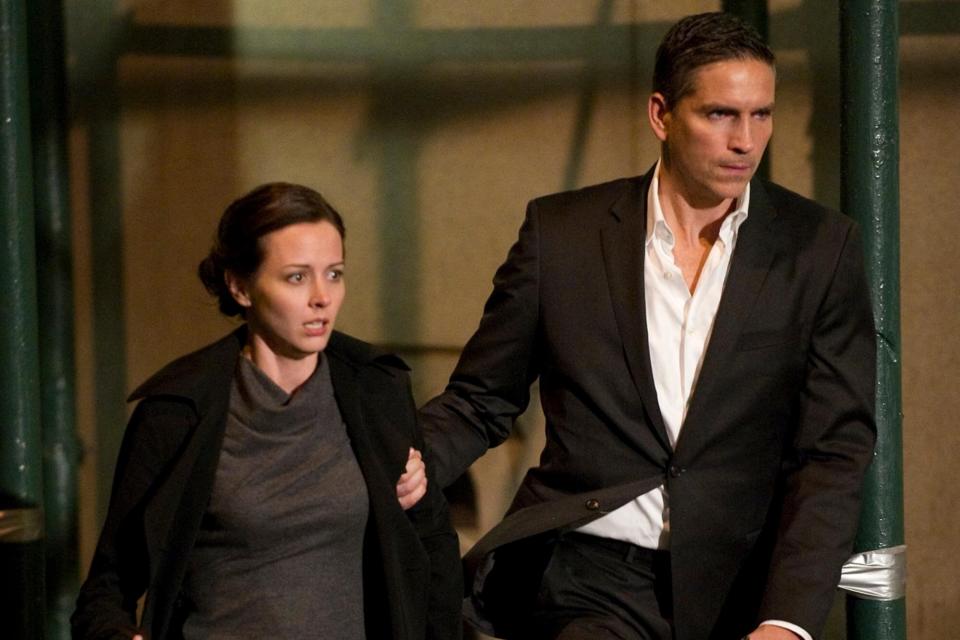
John Paul Filo/CBS via Getty Images Amy Acker and Jim Caviezel on 'Person of Interest.'
The street-level and slow-burning sci-fi arcs finally converge in the season 1 finale when Reese comes to the aid of Caroline Turing (Acker), a therapist HR has been charged with killing. Meanwhile, both Fusco and Carter were running interference with the FBI, who were also hunting the Man in the Suit. Like "Witness," however, there's a twist: Caroline is actually the ruthless hacker and contract killer Root, whom Reese and Finch crossed paths with in an earlier episode. It turns out she ordered the hit on herself to draw Finch out and find the Machine. The episode ends with Root kidnapping Finch.
PLAGEMAN: That's definitely when the freak flag started to fly. [Laughs] Our guys lost again, Root won that one. We knew we wanted to cliffhanger out [at the end of the season], and I think it just kind of always helped us understand that we needed to fill out this world, as Jonah said, the rogues gallery. We kept coming up with, different variations beyond Elias, and you'd the municipal, you had the more federal, and you have the international. We would just keep building it out and we would be able to go back. One of the things we came up with that we thought would sate the network was, "Hey, let's do a three-episode arc [at the end of season 1 and beginning of season 2], tie that one off, and then start another one. And then we can come back to it and they'll leave us alone." But it was tough, I think, being at CBS, which knew what its brand was and we kept trying to change that.
NOLAN: One hundred percent, that's what we felt. My wife, Lisa [Joy], suggested the amazing Amy Acker. We'd seen Root off-camera in an earlier episode, and then brought in the incredible Amy Acker, who I think thought she was doing a guest spot. We started immediately articulating how excited we were for this to go somewhere, and she was probably a little freaked out by these very enthusiastic showrunners. But that episode was kind of a celebration of we felt like the show had found its footing.
"Relevance" (Season 2, Episode 16)

The 'Relevance' episode of 'Person of Interest.'
Executive producer J. J. Abrams originally suggested Nolan make his directorial debut with the pilot, but Nolan decided to wait until this game-changing and propulsive season 2 installment, which he co-wrote with Segel. "Relevance" boldly sidelines the show's cast for most of its runtime, choosing to focus on Shahi's Sameen Shaw, a government agent who hunts terrorists for Northern Lights, a.k.a. the secret Pentagon program responsible for acting on the Machine's intel. When Shaw's partner starts questioning where their intel comes from, the government decides to eliminate them both. Thankfully, Finch and Reese receive Shaw's number and save her. At first, Shaw refuses to join their team, but by the end of the season, she comes on-board.
NOLAN: We always knew we wanted to gently grow into a small ensemble, because we had a big world that we wanted to explore. I remember various moments when we were pitching [the show], [we'd] talk about what the Machine was intended to do and every once in a while, someone will be like, "Can we just do that show? Can we do the show where they catch terrorists? What's this weird show with the creepy guys in the corner using irrelevant numbers?" We always had that tension there, we always knew wanted to go through the looking glass and explore what we have on the other side. We're at 38 episodes in at this point and starting to get restless with the format. I knew I wanted to direct it as soon as [we conceived it].
Typically at this moment with the show as successful as it was in that first season, there'd be conversation about a spin-off. And we're like, "why do we spin-off? Let's spin back into the show and build out the universe of the show within the show itself." Which, I think ultimately was, for our writers room, a way to make the show break out of its format a little bit and allow us to tell stories and have it work. A lot of which comes down to Shahi as this compelling [character]. You're fascinated watching her. She's able to command and upsell, which worked very nicely. And I got to direct, which was super fun.
PLAGEMAN: Jonah would never admit to this, or perhaps he doesn't remember, but I remember when we were sitting in the video village in the pilot and he was twisting in his chair. He's just like, "Greg, [I'm] trying to figure out this television thing. Is it okay if I go up and give the director a note?" I was like, "Dude, you can go fire the director right now." [Laughs]
NOLAN: That's not really how it worked on my brother's set [laughs]...
"Zero Day" (Season 2, Episode 21)
There comes a point in Person of Interest's run where you realize you've grown to care about the Machine, a "character" without a physical form or voice (for now at least). The show accomplishes this astounding feat thanks in part to how much Root cared for and worshipped the Machine (Root refers to the Machine with she/her pronouns, whereas Finch uses "it."), as illustrated in the surprisingly heartwrenching scene from season 2's penultimate episode. As the mysterious and sinister Decima corporation hones in on the Machine's location, Finch reluctantly teams up with Root to beat them to it. In the process, however, Root discovers the crude self-preservation tactics the Machine developed because of limitations Finch programmed into it. (Every night, the Machine essentially kills itself every night before being reborn completely new.)
NOLAN: In the pitch, we'd get asked, "Well, what does the Machine look like?" because they wanted to kind of anthropomorphize it like a giant huge robot with orange eyes or something. We used to say, "It doesn't look like anything. It looks at everything. So when you're watching the episodes, you're going to feel what the Machine looks like through what it's looking at." We basically pitched them this right out of the gate, and foolishly they decided to buy the show anyway, was this idea that you would start with this thing that was very kind of binary and alienating in this cold kind of concept that almost destroyed the table read. And then by the end of this episode, by the end of the second season in particular, you're starting to actually emote and care about it and understand it, and anthropomorphize it without using all of the usual tricks of making it cute or embodying it in some amazing actor. (We'll get to that.) I think that was something the writing staff did together as a group very effectively, just piecing this out in a very disciplined fashion.
"The Devil's Share" (Season 3, Episode 10)
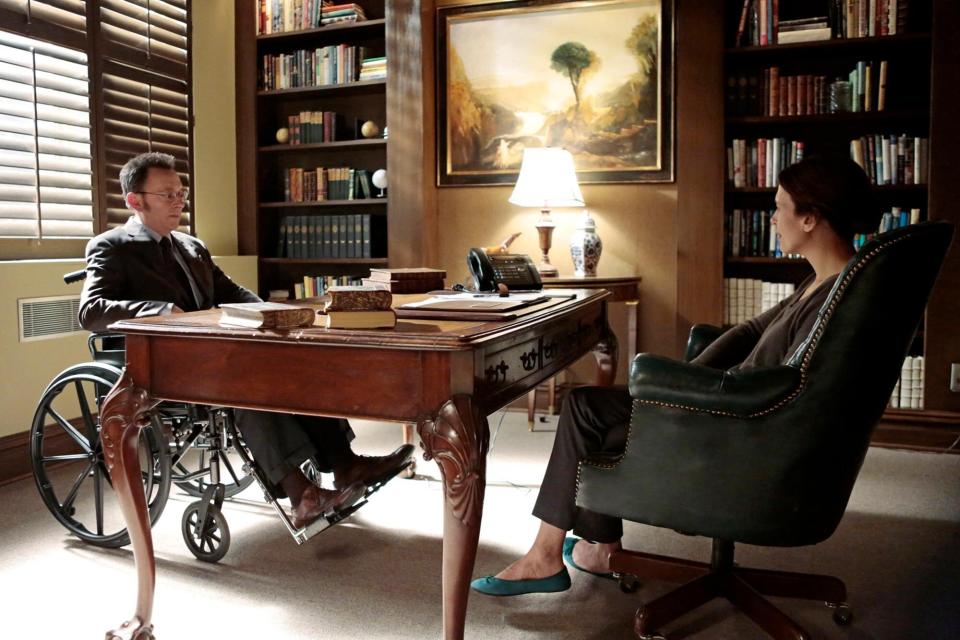
Giovanni Rufino/CBS via Getty Images Michael Emerson in 'The Devil's Share' episode of 'Person of Interest.'
In season 3, Det. Carter embarked on a crusade to take down HR once and for all, with or without Team Machine's help. While she succeeded, she paid the price because Officer Simmons (Robert John Burke), the last HR lieutenant standing, shot and killed her right after the FBI arrested HR's leader. In "The Devil's Share," the episode that followed, Team Machine desperately tries to catch up to a wounded Reese before he finds and kills Simmons, and flashbacks reveal moments when each character had to confront grief, loss, and remorse.
PLAGEMAN: Without a doubt, my favorite opening to an episode. The Johnny Cash cover of the Nine Inch Nails song "Hurt" was a perfect example of holding ourselves to the rule, only use a song if it sends a shiver up your spine when married to picture. I don't think Jonah and I ever had more fun than being the incognito music supervisors of the show for five seasons. We absolutely loved it. That opening montage still gives me goosebumps, no dialogue necessary. After the murder of Carter, we needed raw emotion, and a way to convey the pain and our characters' need to avenge her death. Johnny Cash brought the hurt. We learned so much in this episode about the level of depth in which Carter impacted each of our characters — especially Reese, Fusco, and even Elias. Fusco's story, and how emotional he was in imparting how Carter helped turn his life around, made him a better person, was particularly powerful. A once dirty cop who gives meaning to the title of the episode, Fusco knows all about "the devil's share." And so does Elias, who does the thing to Simmons that everyone wants to do, because he can — even relish it.
Robert John Burke was an incredible villain on the show, who did so many terrible things with such ruthless impunity that I really came to love him. Great mug, great voice, the man still scares the s--- out of me. The thing that makes it so odd is that Bobby Burke is a volunteer fireman, and one of the most selfless, interesting guys you'll ever meet.
"If-Then-Else" (Season 4, Episode 11)
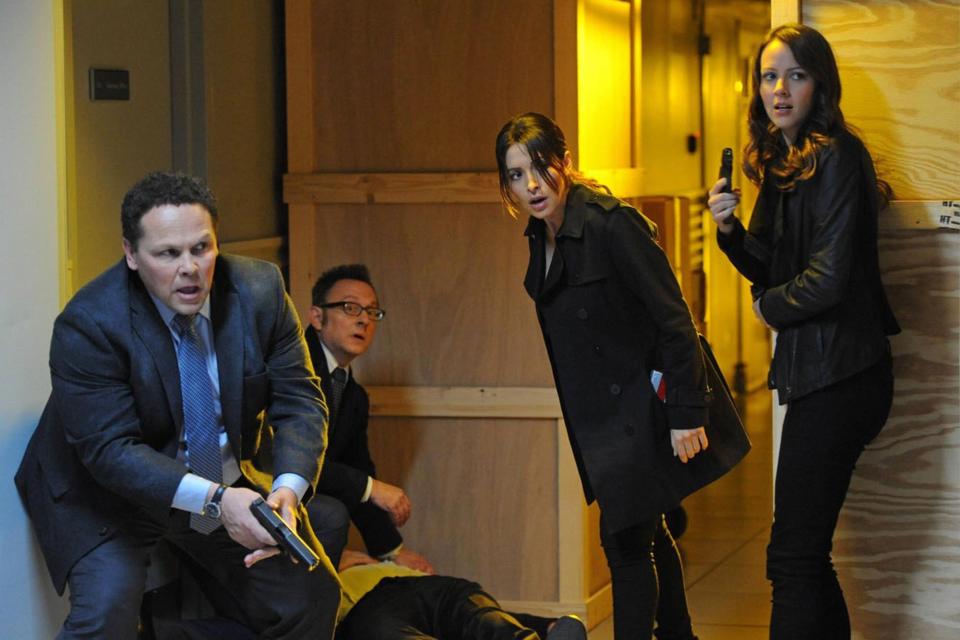
JoJo Whilden/Warner Bros. The 'If-Then-Else' episode of 'Person of Interest.'
Written by Denise Thé, "If-Then-Else" is one the drama's best outings. After the ruthless competing A.I. Samaritan causes chaos in the market as a way of asserting control over the world, Team Machine ventures into the bowels of New York Stock Exchange to set things right. Unfortunately, the whole scheme was a trap to catch them, and Samaritan's forces pin them down as they wait for the Machine, who is communicating with Root directly, to come up with an exit strategy. The Machine proceeds to work through multiple different scenarios, searching for the one that has the highest chance of survival. Even with the Machine's help, though, the team still suffers a loss because Shaw sacrifices herself to ensure their escape — but not before kissing Root. (Thankfully, Shaw didn't die, but was instead captured by Samaritan forces, but more on that in a bit.)
NOLAN: We used to call [executive producer Denise Thé] The Darkness, because she was always pitching killing off characters. She came into [the writers room] with this as a pitch. To get to the fourth season of the show and have one of the [then] co-executive producers walk in and pitch an episode like this you just get incredibly excited about this idea right out of the gate and knew this would be another one of these moments where the show just moved forward. The most fun [part] for me in this episode was us working with Denise on the meta scenes where the characters just explain their lines. Often when you're writing a show, you get to a point where you're like, "Oh yeah, Fusco says some quippy sarcastic s--- [here]" and then you'd come back later and fill it in. This was our chance to just make text of that. But it's an amazing episode. It's Root and Shaw connecting for the first time.

Shaw (Sarah Shahi) and Root shared their first scene together ever in 'Person of Interest' season 2 episode 16's 'Relevance.'
We start leaning a little more into the relationship between Root and Shaw because they were the only characters on the show that had any chemistry. [People ask], "where did these things come from? Did you plan for it?" I knew from the first scene that I shot with those two actors in "Relevance" that they had chemistry, immediately, on-screen. And we had always been looking for some romance in our show and God bless all of our actors, who are amazing, but Amy and Sarah were the only two who had chemistry with each other. We're like, "Okay, we got to explore that a little bit." An amazing for episode for so many different reasons.
"6, 741" (Season 5, Episode 4)

Amy Acker as Root and Sarah Shahi as Sameen Shaw.
After being absent for many episodes, Shahi returns in "6, 741," which begins with Shaw escaping Samaritan's clutches, returning to New York, reuniting with the team, and finally consummating her relationship with Root. Unfortunately, everything starts falling apart and Shaw eventually kills Reese. Worried that she'll betray the team even more, Shaw pulls out a gun and, despite Root's pleas for her stop, kills herself. And that's when the script reveals that all of this was happening in Shaw's mind, because Samaritan has forced her to live through 6,741 simulations in an attempt to find Team Machine's location. In other words, it's a classic "it was all a dream" episode, but it works because it's about how much Shaw cares for not only Root, but the entire team.
NOLAN: Another Denise Thé joint with Lucas O'Connor. I remember hearing this pitch and being scared because, like you said, ["it was all a dream"] episodes never work. [Lisa] and I were shooting the first season of Westworld at this point. I heard this one and thought, well, if anyone's going to pull it off it's going to be Denise. But these one are tough to do.
PLAGEMAN: I think this is when we really started to build the steady drumbeat of Samaritan becoming this all-commensurate A.I. going up against our Machine, and what the fundamental differences were, and building up Greer [John Nolan] as the counterpart to Harold Finch. In other words, someone who had different worldview than Harold Finch, but also felt that if an ASI comes along, he's quite content to hand it the keys. This fall in line, at least in my head, as we were building into the final season with Greer and Samaritan. And as Jonah pointed out, too, Root and Shaw's history and how far we were willing to go with that relationship.
NOLAN: The tension with that was always the classic X-Files tension, right? Of when you have this will-they, won't-they actually get together. But the tension there is always once you bring two characters together romantically, where do you go from there? We were trying to piece this out and get it exactly right. This felt like a romantic and ultimately tragic way to explore that idea of the connection between these two very complicated people. It's always easier if you have a romantic relationship with a show to just it out for as many season you get, but here we felt like wanted to bring them together in a way.
"The Day the World Went Away" (Season 5, Episode 10)
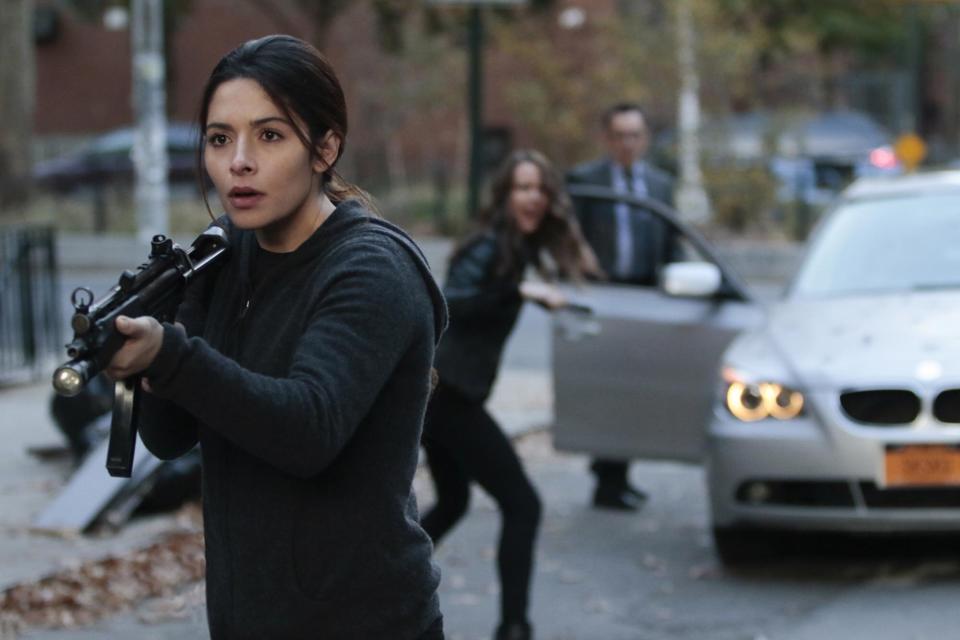
Sarah Shahi as Sameen Shaw, Amy Acker as Root, and Michael Emerson as Harold Finch.
Finch's number is up in Person of Interest's 100th episode, which featured the death of two major characters: Elias, who tried his best to help Finch avoid capture, and Root, who took a bullet for the Machine's maker while evading Samaritan's operatives. Both deaths finally push Finch over the edge and he finally decides to kill Samaritan by any means necessary — including establishing a direct line of communication with the Machine, something he'd been a wary of doing. To his surprise, the Machine finally choses a voice: Root's, whose apotheosis had been planned since season 2.
PLAGEMAN: When Michael [joined] the show, he'd always sort of played this character on Lost, this villainous tight character and I think he was looking to do something different. So we were always hesitant to show that [darker] side of Harold Finch, but we felt like he'd finally been pushed too far enough that this was when we'd love to see Harold go a little bit off the rails.
NOLAN: We'd always planned on [Root] transcending — her fascination [with technology], all those fun scenes in the second season [like in] Greg's "Bad Code" with young Root playing the Oregon Trail and her early loneliness looking for a life out there in the dark wed. And she gets what she wants. It's something we built from the very first time you meet this character: she just wants access to this Machine. She just wants to be closer and closer to, in her mind, this almost divine intelligence. And she gets her wish, but in the most tragic way possible.
"return 0" (Season 5, Episode 13)
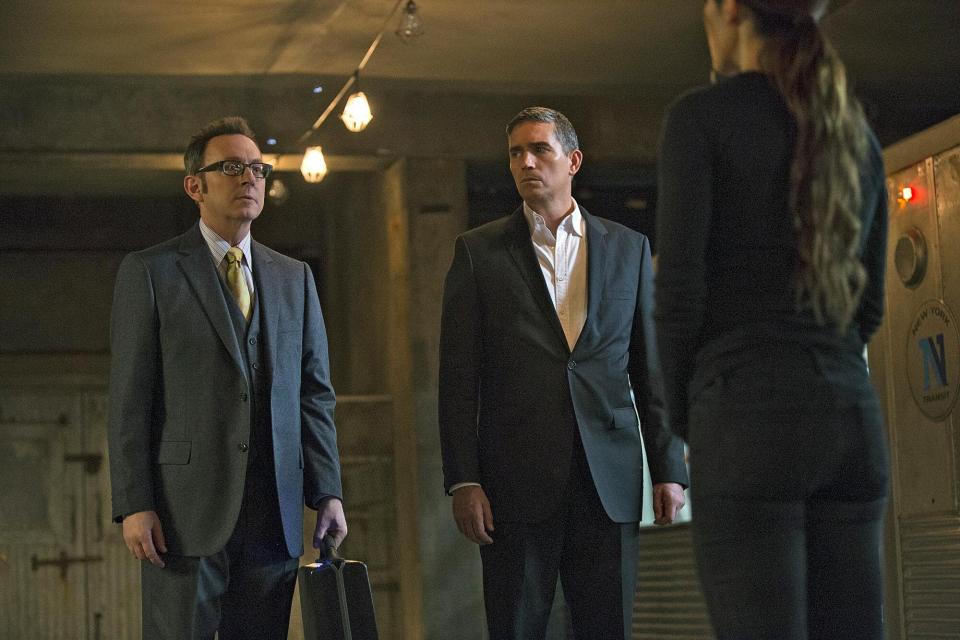
Michael Emerson as Harold Finch, Jim Caviezel as John Reese, and Sarah Shahi as Sameen Shaw.
In the action-packed and heartbreaking series finale, Team Machines races against the clock to destroy the last copy of Samaritan, which results in Reese's death. With the world saved, Finch finally reunited with his wife, Grace (played by Emerson's real-life wife, Carrie Preston), and the Machine/Root contacted Shaw to keep helping people. The series ended with a happy-sad message: "Everyone dies alone, but if you mean something to someone, or helped someone or loved someone or even if a single person remembers you, then maybe you never really die at all."
NOLAN: Wouldn't change a damn thing [about the finale]. There's an interesting story here in terms of when do you know your show is over? There [was] a whole moment of uncertainty for us fourth into the fifth season about whether the show would get picked up. There was a bit of a gamesmanship there between the studio and the network figuring out the larger picture of which shows they had. And we were kind of the utility player at that point. [Greg, Denise, and I] kind of sat down together and said, "They're not going to tell us whether this is the last season. So why don't we cancel the show? Why don't we go ahead and just make it the last season?" Everyone would be happy for us to kind of dangle it out there and try to get a few more episodes and throw a little more money into the syndication pot. But I think for us, it was very, very important, especially with this incredible writer's room and this incredible cast that we end with a complete story. So we had a conversation and we decided that we were going to write to it. We were going to kill it off and end it. And then when no one called and complained about that interview then we kind of knew that we had made the right decision. So we were able to write to it in a way that for me, I think very satisfyingly as a young idiot having a theoretical conversation with J.J. Abrams about making a TV show to get to this moment where we did everything we set out to do with this show. I love the way the show ended and this episode has a little bit of commentary about the nature of endings.
PLAGEMAN: I'm just extremely grateful for the day I met Jonah, because I think we really grew up almost together as like learning to become real television producers with real ambition. I had run a show before, but this was like, Jonah was throwing stuff at me and I'm like, "We can't do that." He's like, "Why not?" "All right, let's do it." And we're flipping cars in the middle of New York City and blowing s--t up and stuff I didn't even think you could do. But also just the level of ambitious. And here we are again, making another show incredibly about something very prescient [an adaption of William Gibson's The Peripheral]. It's blown my mind 10 years later to think, "Wow, this is really eerie because we're making another project now, which has a much scarier concept coming down the pipeline in The Peripheral with William Gibson.
Person of Interest is available to stream on HBO Max right now. Celebrate its anniversary with a rewatch!
Related content:

 Yahoo Movies
Yahoo Movies 
